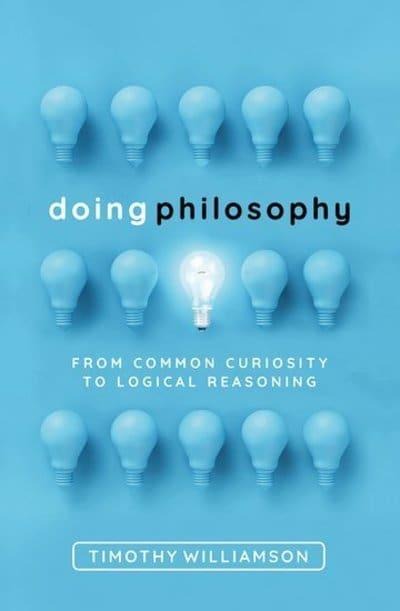
Doing Philosophy (Oxford University Press) by Timothy Williamson
Is philosophy a science? Timothy Williamson thinks so, and has long defended the controversial claim that while philosophy is distinctive in its methods and perhaps in its subject matter, it is ultimately the same sort of enquiry. This requires an unorthodox conception of both science and philosophy. One of Williamson’s opening moves is to broaden the category of science by distinguishing between natural and non-natural sciences. Natural sciences – for example physics, biology and linguistics – study phenomena we encounter in the natural world, like electrons, cells and phonemes, whereas non-natural sciences – for example mathematics and logic – study non-natural objects like numbers and laws of inference.
In Williamson’s account, philosophy is a non-natural “armchair” science that discovers a priori truths about the nature of things. As a non-natural science, philosophy proceeds without conducting experiments (at least not experiments as they are conventionally understood), but still employing methods familiar to the other sciences. It poses questions, builds models to answer them, and selects between these models according to the usual criteria: simplicity, consistency, elegance, scope and unifying power, as well as, of course, how well they fit the facts.
Williamson develops this in his new book Doing Philosophy: From Common Curiosity to Logical Reasoning. Intended for the general reader or philosophical newcomer, the book begins with the tricky questions which virtually all of us have at some point asked ourselves, and shows how, through successive stages of articulation and elaboration, something resembling philosophical enquiry emerges. As the chapter titles of this neatly structured book have it, philosophy “Start[s] from Common Sense”, and proceeds initially by “Disputing” the deliverances of common sense, “Clarifying Terms” used in the dispute, before moving onto higher order conceptual tools: “Doing Thought Experiments”, “Comparing Theories”, “Deducing”, “Model-Building”. These activities are common to philosophy, physics, biology and economics, and Williamson’s view allows for significant overlap and cross fertilisation between disciplines. It is a picture of philosophy that many will find inspiring.
If philosophy isn’t a science, then what is it? To borrow the title of a book by another well-known Oxford philosopher, the late Bernard Williams, we might think of philosophy as a “humanistic discipline”. Viewed in this way, philosophy would not so much contribute to a clearly defined body of knowledge, as contribute to the self-understanding of those humans engaged in it.
This is not to say that knowledge and self-understanding are entirely distinct, or that they pull in different directions. Indeed, they had better not, at least if we want our self-understanding to be rooted in accurate knowledge of how things are, or if we want our pursuit of knowledge to be directed by the things we consider to be important. But this approach means thinking of philosophy as providing something distinctively human – something that, unlike science, cannot be entirely separate from the perspective of those engaged in it. From this angle, any conception of philosophy which seeks to eradicate the human perspective will be in some sense impoverished.
But perhaps the characterisation of philosophy as a science is intended more as a prescription than a definition. In the final, short chapter of his book, Williamson writes that philosophy is a science “under constant pressure to be something else: lifestyle advice or political polemic, moralising sermon or grammar lesson, godless religion or unreadable literature, pop physics or pop biology, pop psychology or pop neuroscience, calculation or opinion poll”. It is unclear whether Williamson would still disavow these goals if they were reframed in more charitable terms (“political polemic” as “socially engaged”, “lifestyle advice” as the question, once the central question of ethics, of “how to live well?”). But he does claim that these pressures come from “philosophers’ own insecurities about their field”.
This much is correct: philosophers have a whole complex of insecurities, perhaps the greatest being that the work is navel-gazing. This feeling is understandable in a discipline where the major questions are more or less the same as they were for Aristotle, and where progress seems elusive, if not impossible. Since at least Newton, science has been seen as a model – the model – of progress, of a cumulative body of knowledge moving gradually towards the truth. We might, then, be tempted to think that philosophy would make more progress if only it were more like science.
Williamson argues that this kind of thinking gives a “false picture of progress in philosophy and the sciences”. Both disciplines build models and steadily improve them in light of evidence or innovation. If it seems as if philosophy makes no progress, it is because it jettisons parts of it that develop – just look at biology emerging from “natural philosophy” in the 19th century, or psychology splitting from “mental philosophy” in the 20th.
It is probably true that we often misunderstand the nature of progress in philosophy. But that doesn’t mean that the pressures on philosophy to be “productive” don’t structure the way that philosophers think about their discipline and its aims. In the neoliberal university, humanities in general are desperate to claw back some of the vanishingly small pot of funding in an age of STEM dominance. So it’s a good strategy for philosophy to cast itself as a progressive, rigorous subject, essentially the same sort of inquiry as “productive” disciplines like maths, physics or economics. Both intellectual and institutional insecurities breed a particular view of what philosophy could look like if it is to be more than navel-gazing. If philosophy is under pressure to be anything, it is under pressure to be a science.
This short book exemplifies Williamson’s approach to philosophy: it is clear, rigorous and unafraid of confrontation with opposing ideas. For the general reader it is, like his earlier Tetralogue, an excellent invitation to philosophy: provocative but considerate, exacting yet encouraging. For philosophers, it is a demand to do better, a rallying call to think of their work as rigorous, collaborative and progressive – in short, as scientific. That would be no bad thing. But it would be a shame if philosophy forgot those other things it might also be.
This article is from the New Humanist winter 2020 edition. Subscribe today.

